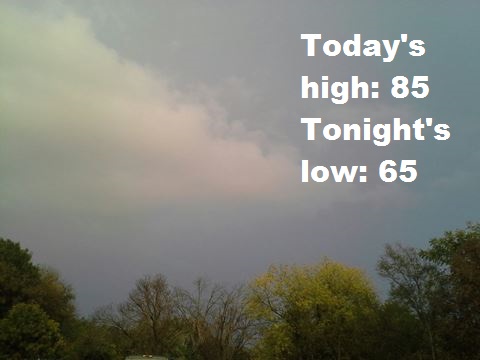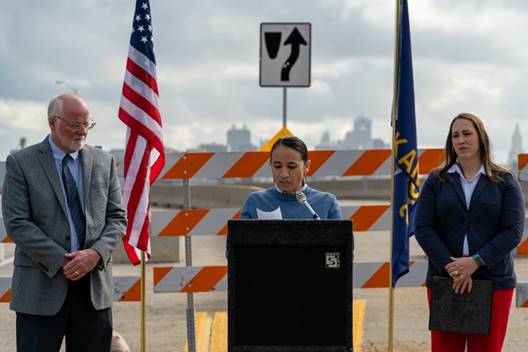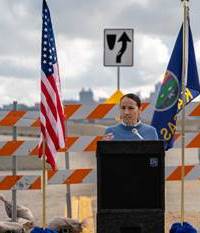by Abigail Censky, KCUR and Kansas News Service
Republicans in Kansas are intent on pushing back against a forthcoming federal vaccine policy for private employers. The only problem? It isn’t written yet. But the politics of a non-existent policy are benefiting both sides.
Kansas Republicans opposing COVID-19 vaccine requirements are pushing ahead with an effort to sidestep a federal vaccine mandate that hasn’t yet been written. GOP members in the Legislature created a special committee to look for ways to fight President Joe Biden’s proposed policy, which they see as an egregious overreach of government.
“I hope that it will open some eyes in the community,” said state Sen. Mike Thompson, a former meteorologist who circulated misinformation and cast doubt on the efficacy of vaccines and masks throughout the pandemic.
“We’ve got a lot of folks who are reaching out to us,” he said, “begging us for help.”
It’s the latest move by Republicans to challenge public health policies aimed at slowing the spread of the coronavirus as the state comes down from a summer surge in cases fueled by the delta variant. The new committee was formed the day Gov. Laura Kelly ordered flags be flown half-staff in honor of the 6,024 Kansans who’ve died of COVID-19 and before the final federal policy has been published.
In the coming weeks, the nine Republicans will likely overpower the committee’s three, not yet appointed, Democrats to determine if it’s possible to thwart an impending federal vaccine mandate.
Republicans in the state’s congressional delegation are also mounting several legislative challenges, and the state’s Republican attorney general has sworn he’ll challenge the policy. However, there’s one very large problem: the fine print of the policy mandating employers with more than 100 employees to require vaccinations or regular testing doesn’t exist yet.
Some lawmakers wanted a special session to fight the mandate, but Republican Senate President Ty Masterson said it might be premature.
“Even if there were a special session, what we would do is we would have a committee meeting hearings, right?” he said when lawmakers formed the committee.
A special legislative session could cost Kansas taxpayers up to $65,000 dollars a day.
“It’s a little bit of cart and the horse,” Masterson said of calling lawmakers back to Topeka when there are still questions surrounding what the policy will look like.
“All of that’s a little bit up in the air right now,” said Marcus Plescia, chief medical officer with the Association of State and Territorial Health Professionals.
“If this is framed as what we call a preemptive policy,” he said, “then states may be very limited in being able to do any laws of their own about this.”
Only one state, Montana, bans private employers from requiring employees to be vaccinated, and a Montana legal firm is currently challenging the law. Similar legislation in Kansas failed to pass the state Senate earlier this year.
According to the National Academy for State Health Policy, vaccination mandates for state workers are banned in eight states, but state employees are required to be vaccinated in 19 states.
The uncertainty about the vaccine mandate hasn’t stopped Kansas Republicans in Washington from producing a flurry of legislation ahead of the Occupational Safety and Health Administration publishing its emergency temporary standard.
Sen. Roger Marshall introduced an amendment, which failed along party lines, attempting to block the government from using any federal funds to enforce COVID-19 vaccine mandates. Rep. Tracey Mann also introduced a bill attempting to block OSHA from creating any temporary emergency standards around vaccines, and Rep. Ron Estes has announced he plans to introduce a bill to guarantee religious exemptions under the emergency standard.
Mann and Estes have also signed onto a letter urging Biden to drop the policy. Attorneys general in 24 states, including Kansas Attorney General Derek Schmidt, also vowed to challenge the policy once it’s written.
Yet congressional Republicans may be bound by the same constraints as state lawmakers if the federal policy is written to prevent loopholes. The administration could also be slow walking the rolling out of an official policy while companies begin to take action.
“That could be part of the tactic,” Plescia said, “just stall the implementation for so long that, by the time it clears, the time to do this has passed.”
As an example, the new CEO of Cerner Corp., David Feinberg, instituted a vaccine mandate for the Kansas City area’s largest private employer in early October.
Retired labor attorney Charles Gordon posited in the Wall Street Journal that a policy that never arrives, “may prove more useful as a Sword of Damocles than a real requirement.”
The very idea of challenging the policy is also politically expedient for Republicans. Polling from the Associated Press-NORC Center for Public Affairs Research indicates a majority of Americans support Biden’s potential vaccine mandate or regular testing for private employers, but 6 in 10 Republicans oppose the policy.
Plescia is worried in states like Kansas, the Legislature could threaten long-standing public health policies. A challenge to COVID-19 mandates could open Pandora’s box, weakening popular public health rules like child vaccination requirements in schools or other public health policies.
“From what we’ve seen recently with a lot of other curtailing of public health powers,” Plescia said, “we are concerned about this. It could be the thin edge of a wedge in some states.”
Jim McLean of the Kansas News Service contributed to this story.
Abigail Censky is the political reporter for the Kansas News Service. You can follow her on Twitter @AbigailCensky or email her at abigailcensky (at) kcur (dot) org.
The Kansas News Service is a collaboration of KCUR, Kansas Public Radio, KMUW and High Plains Public Radio focused on health, the social determinants of health and their connection to public policy.
Kansas News Service stories and photos may be republished by news media at no cost with proper attribution and a link to ksnewsservice.org.
See more at https://www.kcur.org/news/2021-10-07/kansas-lawmakers-want-to-challenge-a-covid-19-vaccine-policy-that-doesnt-exist-yet




